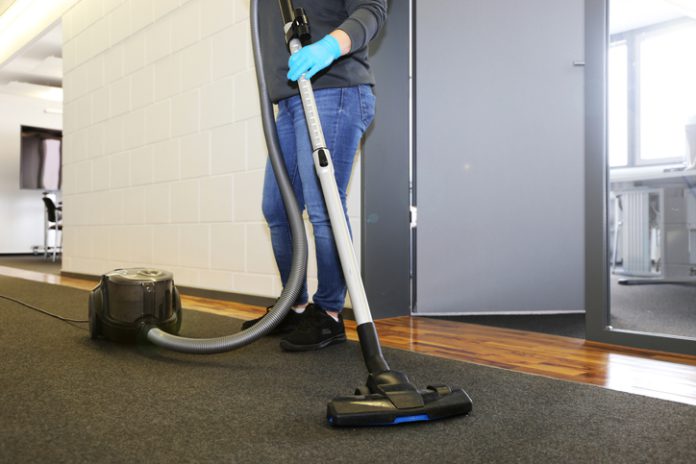When it comes to choosing a flooring material for a commercial business, there are several factors to consider. The flooring should be not only visually appealing but also durable, easy to maintain, and safe for employees and customers. Some of the most common and popular types of flooring utilized in commercial businesses can include ceramic, vinyl and commercial carpet. These selection of floorings provide their own individual benefits to a commercial space.
Here are some of the best flooring materials to use in a commercial business.
1. Ceramic and Porcelain Tile
Ceramic and porcelain tiles are popular choices for commercial businesses due to their durability, ease of maintenance, and aesthetic appeal. They are made from natural materials and come in a variety of colours, patterns, and sizes. Additionally, they are resistant to stains, scratches, and moisture, making them perfect for high-traffic areas.
Ceramic and porcelain tiles are also easy to clean and require minimal maintenance. They can be swept or vacuumed regularly to remove dirt and debris, and occasional mopping with a mild detergent solution will keep them looking great for years to come.
2. Vinyl Flooring
Vinyl flooring is another popular option for commercial businesses because of its durability and affordability. Vinyl is made from synthetic materials and comes in a wide range of styles and colours, including patterns that mimic the look of natural materials like wood and stone.
Vinyl flooring is also easy to clean and maintain. It can be swept or vacuumed regularly, and spills can be wiped up with a damp cloth. More so, it is resistant to stains, scratches, and moisture, making it perfect for high-traffic areas like retail stores and restaurants.
3. Carpet Tiles
Commercial carpet tiles are often an optimal selection of flooring for commercial businesses that want the warmth and comfort of carpet with the durability and ease of maintenance of a hard flooring surface. Carpet tiles are made from synthetic materials and come in a variety of colours, patterns, and textures.
Some of the reasons so many business owners opt forcarpet tiles is that they can be easily replaced if they become stained or damaged without the need to replace the entire carpet. They are also easy to clean and maintain, with regular vacuuming and occasional steam cleaning.
4. Concrete
Concrete flooring has become increasingly common choice in flooring for commercial businesses due to its durability, low maintenance, and versatility. Concrete can be polished or stained to create a variety of looks, from sleek and modern to rustic and industrial.
Concrete flooring is also easy to clean and maintain. It can be swept or vacuumed regularly, and spills can be wiped up with a damp cloth. Additionally, it is resistant to stains, scratches, and moisture, making it perfect for high-traffic areas like retail stores and restaurants.
5. Natural Stone
Natural stone flooring, such as marble, granite, and limestone, is a luxurious and durable choice for commercial businesses. Natural stone is made from natural materials and comes in a variety of colours, patterns, and textures.
The advantages of natural stone flooring is that it is easy to clean and maintain. It can be swept or vacuumed regularly, and spills can be wiped up with a damp cloth. More so, it is resistant to stains, scratches, and moisture, making it perfect for high-traffic areas.
6. Rubber Flooring
Rubber flooring is a great alternative type of flooring for commercial businesses that require a high level of slip resistance and durability. It is made from synthetic materials and comes in a variety of colours and textures.
The benefits of rubber flooring include that it is easy to clean and maintain. It can be swept or vacuumed regularly, and spills can be wiped up with a damp cloth. Further more, it is resistant to stains, scratches, and moisture, making it perfect for high-traffic areas like gyms and hospitals.
Considerations When Choosing Flooring for a Commercial Business
When choosing a flooring material for a commercial business, there are several factors to consider. These include:
- Durability: The flooring should be able to withstand heavy foot traffic, spills, and other types of wear and tear.
- Maintenance: The flooring should be easy to clean and maintain, as commercial businesses may not have the time or resources for extensive upkeep.
- Safety: The flooring should be slip-resistant to prevent accidents and injuries.
- Aesthetic Appeal: The flooring should be visually appealing and complement the overall design of the commercial space.
- Budget: The cost of the flooring should fit within the business’s budget while still providing the necessary level of durability and functionality.
Conclusion
Choosing the right flooring for a commercial business is an important decision that requires careful consideration and meticulous planning. Ceramic and porcelain tiles, vinyl flooring, carpet tiles, concrete, natural stone, and rubber flooring are all popular options that offer durability, ease of maintenance, and safety for employees and customers. When selecting flooring, it is essential to take into account factors such as durability, maintenance, safety, aesthetic appeal, and budget to ensure the best choice for the business.














